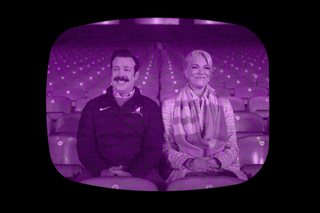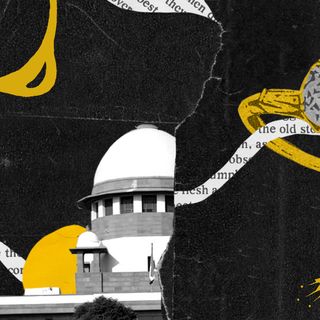
Family Is More Than Blood Relations, the ‘Ted Lasso’ Finale Reminds Us
Ted Lasso’s swansong culminated in an emotionally charged, nuanced video essay on the twin themes of family and personal growth.

This article contains spoilers for Season 3, episode 12 of Ted Lasso.
Remember when Ted Lasso enlightened a freshly dumped Coach Beard, saying, “All people are different people,” just as the latter was about to swear off of dating women in the same profession as his ex? Well, Lasso doesn’t either. But in the same way that Ted Lasso‘s eponymous character has spent three seasons offering life lessons without batting an eyelid — almost as if they were candies or, to make a more Lasso-like analogy, the green army figurines — the final episode of the season (and probably the series) left us with another, very similar lesson: “family” isn’t a term whose definition can be limited to blood relations and traditional hierarchical structures.
People are different, and so are their interpretations of family. For some, it indeed refers to a biological unit; for others, it could mean a football club; yet some might consider their friends their family. And just like we, as humans, continue to grow and evolve through the course of our lives, so can our perception of family. In a sense, it emphasizes that our personal growth is inextricably tied to the people we love, care for, and surround ourselves with — our families. However, the latter should cheer our growth, open their arms for us when we’re down, be ready to hit us with the truth on occasion, motivate us to reach our potential, but also, never expect us to stop being ourselves. The show has been peppered with numerous examples of this through the course of this season — in Ted’s vision for the players of AFC Richmond, in the friendship between Rebecca and Keeley, the delicate dynamic between Roy and Jamie, and of course, the camaraderie of the Diamond Dogs.
Yesterday, Ted Lasso began its swansong by hinting that the sense of community it has always inspired — probably to culminate in an emotionally charged, nuanced video essay on the twin themes of family and personal growth — was going to be stronger with this episode. Within the first few minutes, it’s almost like the show mocked its viewers through its “Rebecca-Ted fake out,” as The New York Times called it — reminding us, subtly, that it wasn’t a show about the love lives of its lovely characters, but about how they come together as a team, becoming each other’s family through it all, both on and off the field.
A more non-subtle reminder of the same comes toward the end of the episode when Trent Crimm changes the name of his book to “The Richmond Way” from “The Lasso Way” upon Ted’s advice: “It’s not about me. It never was.” It sets the tone for the rest of the episode.
Ted’s idea of family has strongly revolved around his son, always. But the trauma of losing his father early drove him to preemptively shield his son from the grief of losing him — prompting his decision to accept a job in a different country on a different continent. Having worked through his trauma in therapy, though — marking the emotional growth that had also resulted in him confronting his mother in the penultimate episode — he returns home, into the arms of his son.
Related on The Swaddle:
‘The Marvelous Mrs. Maisel’ Explores How We Can Never Completely Know Anyone
For Rebecca, AFC Richmond had started out being a pawn in her mission to one-up her cheating ex-husband. But in time, it became her family — simultaneously indicating the growth of her character, from a bitter ex-wife to a powerful businesswoman, considerate boss, kind friend, hopeful romantic and, as the tabloids christened her, a “club matriarch.” As the psychic had predicted, her life does, in a way, lead her to motherhood. But instead of parenting a child, she finds herself parenting Richmond — a realization that dawns on her when the club’s loyal fans call her “the mother we never had.” In doing so, the show dives into the theme of subverting the conventional notion of family.
Rebecca does meet a man, though. And this man has a young daughter, too. But that’s not why Rebecca abandons her plan to globetrot and “Drink, Sleep, Fuck.” She does it, instead, because, like Ted, she, too, wants to stay close to her family — AFC Richmond — as she admits to Ted right before their goodbye hug at the airport.
For Keeley, too, the final episode was a bit of a homecoming. “[Her] re-integration into the club’s orbit following her fallout with Jack is welcome,” notes The Hollywood Reporter. It’s almost like the parable of the Prodigal Son — except, as the show has underlined in the past, Keeley did no wrong. And so, she wasn’t welcomed back with clemency, but with conviviality. The ease with which she walked in and out of the locker room, made her way into Ted’s office, and simply, strode through the club’s building is reflective of he kind of comfort that only an affable sense of familiarity affords. Richmond had, after all, kickstarted her career in public relations, let her move on to bigger things without holding the slightest bit of resentment, and offered her its metaphorical shoulder when she was down.
The trajectory of her personal growth, too, has been as unique as her career graph and her wardrobe and decor choices. The narrative had, since the last season, focused too much on her love life than on the way she conducted business. But, perhaps, that’s the aspect of her personal growth that the show’s writers wanted to highlight — liberating her from the “Jamie vs. Roy” arc as she throws the injured men out of her house after they confess to having fought over who is worthier of her affection. The past episodes had pretty much closed the chapter on her relationship with Jack, too — leaving her to figure out her life on her own terms, a theme that the photo-shoot sequence in the previous season had played up. The difference: she was heartbroken about it, and then simply going where the waves took her; having made the decision herself this time, she isn’t just empowered but also happier in her position.
Roy’s growth through the seasons, too, has been striking — finishing second only to Jamie’s, perhaps. From refusing to end his glorious career as a footballer to becoming a coach for AFC Richmond, Roy Kent had already come a long way. But the finale boosted it significantly by making his character finally embrace emotional vulnerability by asking to join the Diamond Dogs. Further, by choosing to seek help through therapy, he actually followed Higgins’ advice, “Human beings are never gonna be perfect, Roy. The best we can do is to keep asking for help and accepting it when you can.”
Related on The Swaddle:
How Knowledge, Secrets Become the Underrated Currency of Power in Pop Culture
Roy — besides Ted, of course — was instrumental in Jamie’s personal growth, too. From a self-absorbed prick, Jamie became a respectful, cordial team player — apologizing for the error of his ways and cultivating deep friendships with his teammates. In fact, when the actual Prodigal Son in the show, Nate, returns to AFC Richmond, he’s surprised to see that Jamie and Roy, who had been at loggerheads with each other for years, were buddies now. In a sense, they became family, too — with Roy as the older brother to Jamie.
But in addition to becoming a better friend and a reliable teammate, Jamie also chose to forgive his abusive dad — but for his own sake, not that of his father, especially since the anger he held onto had literally begun translating into meltdowns for him.
The finale did leave a few threads untied, though: has Michelle realized that Jacob is a tool and broken up with him? Has he lost his license? Will Rupert Mannion’s downfall be as deliciously vindicating as we’d like it to be? Will Higgins and his wife adopt another cat? Did Keeley influence Jack Danvers’ parting ways with her father? Will there be a spinoff of Ted Lasso with the AFC Richmond’s women’s team? There are many, many questions fans are asking.
The finale of Ted Lasso may not have been perfect. Especially so, given how the tear-jerker left its fans clamoring for more, hoping against hope that Rebecca will somehow be able to convince Ted to say, so the collective camaraderie of Richmond can go on — breathing wholesomeness into our lives, weekly, for a few months every year, and reminded us that sportsmen don’t need toxic masculinity to succeed. In the post-pandemic world ravaged by depression and anxiety — something the show has been lauded, time and again, for acknowledging in its narrative arcs — Ted Lasso was almost like an honorary antidepressant that did its job without curbing our sex drives or upsetting our tummies. Emotionally, then, it’s difficult to call the end of something so many of us wish never ended, “perfect.” But as Coach Beard sagaciously reminds us in the finale, “Change isn’t about trying to be perfect. Perfection sucks. Perfect is boring.”
When the show’s trailer used the soundtrack for You Can’t Always Get What You Want by the Rolling Stones, perhaps, it didn’t just foreshadow the fact that AFC Richmond wouldn’t win the premier league. It was, conceivably, a parting lesson from the coaches that we, indeed, can’t always get what we want. But as Ted also taught us, “be a gosh-darn goldfish,” “[do]n’t bring an umbrella to a brainstorm,” and the most important one: “believe.”
Devrupa Rakshit is an Associate Editor at The Swaddle. She is a lawyer by education, a poet by accident, a painter by shaukh, and autistic by birth. You can find her on Instagram @devruparakshit.
Related


Woe Is Me! “My Boyfriend Is Still Obsessed With His Ex. What Should I Do?”
